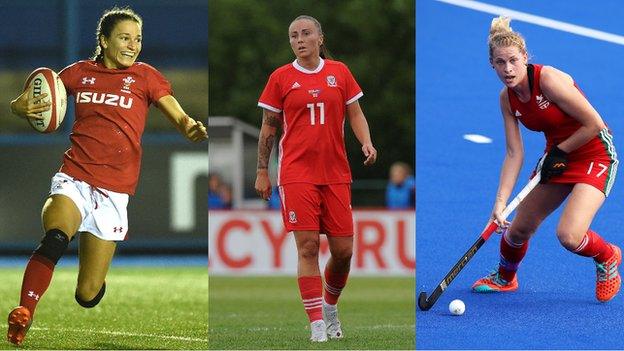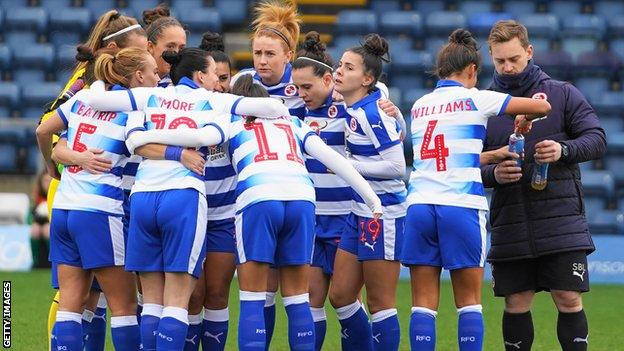Coronavirus: What will be the impact on women's sport?
- Published

Jasmine Joyce, Natasha Harding, Leah Wilkinson
With warnings that women's sport must be safeguarded from the economic effects of coronavirus and uncertainty across the world about the resumption of sport, it is an especially worrying time to be a female athlete.
Women's sport is among the most at risk, with monetary disparity clear as sport in the UK attempts to deal with the issue of a "financial black hole."
Fifpro, world football's players' union, warns the women's game could be hit much harder by the virus than the men's game, despite Fifa continuing with its $1bn investment in women's football.
After a growth period, women's sport is in a perilous position.
Women's sport facing a period of 'huge risk'
A lack of finance in women's sport makes it especially vulnerable, according to Professor Laura McAllister, an ex-Wales international footballer and former head of Sport Wales.
"I think we all know there are huge risks facing women's sport," she said.
"The basic issue about lack of formality with player contracts for women athletes, we've seen some of that with women's football already.
"Some clubs have seen their women players as pretty expendable, basically, so while they have been furloughed, there is no guarantee they will go back to receiving the same level of salary as before and some clubs have gone under.
"This applies across the board in all sports - in cricket, in rugby, even athletics - the women's side is regarded as more of an afterthought than the resumption of men's sport.
"If governance, as it is, is so skewed towards the men's side, this is inevitably going to happen in a time of crisis."

Wales are currently second in their Euro 2021 qualifying group. Pictured here are Sophie Ingle (left), Angharad James (centre) and Natasha Harding (right)
'We knew we would play second fiddle'
In football, the Women's European Championship - set to be held in England in 2021 - will be moved to the summer of 2022 and the Women's Super League [WSL] is on hiatus.
While Euro 2021 could conceivably have been staged as scheduled, it was moved in order to avoid a clash with the Olympics and men's Euro 2020 tournament, both of which have been pushed back a year.
Reading captain and Wales forward Natasha Harding feels the right decision has been made to ensure Euro 2021 does not lose its spotlight.
"It makes a lot of sense [to postpone] as there would be too much football to cram in with three big events in three months," she said.
"Going from previous knowledge, the women's tournament would take a back seat to the other two competitions, and we want an equal stage like everyone else."
However, there will still be a scheduling overlap, as Prof McAllister points out.
"We are lagging so far behind, the sporting calendar shifting around is just a further blow," she said.
"Because of Euro 2021 moving back a year - and there was no real discussion about it - there is now going to be an overlap with the Birmingham Commonwealth Games.
"So we are now going to have women athletes who normally in the Commonwealth Games are getting all the attention, but now they will share the spotlight because of the women's Euros."

Reading were the first WSL team to announce they were furloughing their players
'It is a really scary time'
Football continues to be the sport with the biggest financial discrepancy between male and female teams.
While Manchester United, the club fifth in the Premier League, continue to pay their players their vast salaries, the team fifth in the WSL, Reading, became the first in the division to place their players on the government's furlough scheme.
The club will pay the remaining 20% of players' salaries and while Reading are seeking a deferral agreement with their men's team, nothing is agreed.
"It is a difficult time... but the club have been very clear with us in the process," Reading and Wales midfielder Angharad James said.
"A lot of businesses are furloughing staff and that's how it is - to survive it needs to happen.
"It is a really scary time. It will be over… but of course I really miss football."
Contract structure is another concern in the women's game. While a Premier League player would sign, perhaps, a five-year, year-round deal, contracts in the women's game tend to be much shorter.
Tottenham forward Megan Wynne, on loan at Bristol City, admits it is an added cause for concern.
"Obviously it's difficult. The contracts in the women's game aren't as long as men and they're not as secure," she explained.
"Bristol have been touch with us regularly and we haven't heard anything that anything's going to happen with our contracts... we have to try and stay positive.
"The women's game is growing massively so hopefully these fears around these short-term contracts won't be in place forever, we need that bit more stability and not to have to worry about those things off the pitch."
Jasmine Joyce says competing in the Olympic sevens tournament and the Rugby World Cup in 2021 will be significant challenge
'It is going to be tough because women's rugby was on the up'
As is the case with football, there is a huge financial discrepancy between the men's and women's games in rugby.
Wales wing Jasmine Joyce, who should now have been on a Team GB training camp before an expected Olympic appearance in rugby sevens, admits everything is uncertain.
"It was challenge before this, financially, being full time, all of that, now all the unions and a lot of businesses will be behind on everything," she explained.
"It is going to be tough because women's rugby was on the up and positive stuff was happening, but who knows what will happen now, you can only hope for the best.
"Investment is key for us, massive. We want to be full time athletes competing against other nations who are full time. If we lose investment, it would be a big blow."
Most of Wales' players are amateurs with full-time jobs, but uncertainty and possible player welfare issues loom with the 2021 World Cup set to be just a few weeks apart from the rescheduled Olympics.
Can players realistically feature in both? Joyce wants to try.
"We've heard nothing; we don't really know what is going to happen," she said in regard to whether the same squad will be selected for the Olympics.
"With older members of the squad, are they retiring now or carrying on another year? The England girls are negotiating contracts, so are the same people going to be contracted? There are so many things that can happen. So I just don't know.
"There would be a 35-day turnaround between the Olympics and World Cup, it would be hard physically and mentally… but to play in both again is a dream of mine."
Sailor Hannah Mills postpones her retirement to compete at the rescheduled Olympics
Uncertainty aside from financial issues
In less well funded sports, financial stresses exist at all times, but the coronavirus pandemic and the decimation of the sporting calendar has forced some fairly major life changes.
Great Britain sailor Hannah Mills, a two-time world champion and Olympic gold medallist, intended to retire in August, but has shelved those plans for 12 months with her selection for 2021 confirmed.
"Firstly it's a relief that it is postponed and not cancelled, but then the reality sets in," she said.
"I was going to retire as an athlete and start my next chapter after the Olympics.
"The Olympic build-up is massive, it is eight months where you prepare for nothing else.
"I was well prepared [to deal with the news], even though I had some pretty big lows and felt pretty depressed about it being postponed."
For GB and Wales hockey player Leah Wilkinson, a full-time history teacher who took a sabbatical to go to the Olympics, a change of plans must be made with her pupils' interests in mind as well as her own.
"Everything is up in the air, it was a brilliant plan I had! The school was happy, I was happy, but obviously everything changes," she said.
"I spoke to my headmaster straight away after the postponement and we've had good discussions and the communication lines are open. Everything can be worked out, hopefully."